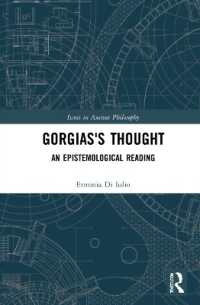Full Description
This book explores how language is used to create division and discrimination in diverse European societies by emphasizing differences in ethnicity, race, national identity, beliefs, or appearance. The authors analyze how public discourse—particularly in political and media narratives—shapes and reinforces an "us vs. them" mindset. They examine words and expressions that denigrate or marginalize specific groups in Polish, German, Czech, Slovak, and Croatian, and observe how certain communities are also reclaiming terms that were once hurtful. The analyses of linguistic strategies employed in the process of othering demonstrate that the concept of othering can be effectively applied to linguistic data.
Contributors are: Dagmara Banasiak, Marta Chojnacka-Kuraś, Marta Falkowska, Jadranka Gvozdanović, Milena Hebal-Jezierska, Agnieszka Karlińska, Anna Kołos, Marie Kopřivová, Marek Łaziński, Jadwiga Linde-Usiekniewicz, Agnieszka Mikołajczuk, Iva Petrak, Jiří Rejzek, Lucie Saicová Římalová, Łukasz Wnuk, and Magdalena Zawisławska.
Contents
List of Figures and Tables
Notes on Contributors
Othering and Language: An Introduction
Marta Falkowska and Jadwiga Linde-Usiekniewicz
Part 1 Naming for Othering in a Diachronic Perspective
1 Othering Construed and Maintained in Discourse
Jadranka Gvozdanović
2 We are my 'us' and They are migranti 'migrants', emigranti 'emigrants', přistěhovalci 'immigrants', uprchlíci 'refugees', and Others
Othering in the Context of Migration in Czech
Lucie Saicová Římalová, Marie Kopřivová, and Jiří Rejzek
Part 2 Naming for Othering in an Identity Debate
3 Naming the Other in Croatian Purist Discourse: A Study of Croatian Online Forum Debates
Iva Petrak
4 Polish Neologisms cebulak 'onioner' and fajnopolak 'cool-o-Pole' as Signs of Othering within the Polish National Community
Dagmara Banasiak and Łukasz Wnuk
Part 3 Naming for Othering as a Strategy of Stigmatization
5 Ethnic Names in Translation as a Measure of Their Stigmatizing Potential in the Target Language
A Parallel Corpus Study
Marek Łaziński
6 Teachers (on Strike) as "the Others" in Polish Media Discourse
Contempt Speech against Teachers in Media Articles and Accompanying Comments (Results of a Pilot Study)
Agnieszka Mikołajczuk
7 Linguistic Strategies of Ethnic Othering and Exclusion on the Polish Social Networking Service Wykop.pl
Anna Kołos and Agnieszka Karlińska
8 Troubled Neighborhood: Ethnophaulisms Referring to Ukrainian People in Contemporary Polish
Marta Falkowska
Part 4 Naming for In-group Purposes
9 Marking a Difference vs. Naming for Othering: Marginalized Groups' Terms for Dominant Majorities
The Case of Polish Deaf Writing about the Hearing
Jadwiga Linde-Usiekniewicz
10 I'm not Obese, I'm Fat! Reclamation of Words as a Strategy for Building Group Identity in the Polish Fat People Discourse
Magdalena Zawisławska and Marta Chojnacka-Kuraś
11 Naming the Sides of the Israel-Hamas Conflict in Czech, Slovak, and Polish Texts
Milena Hebal-Jezierska
Afterword
Jadwiga Linde-Usiekniewicz and Marta Falkowska
Index







